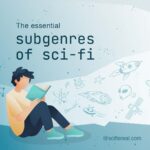News
Selected Science & Sci-Fi news from around the world on the latest in technology, space exploration, artificial intelligence, robots, and everything that leads science fiction to become reality.
Science, Technology & Sci-Fi News (April 2024)
Scientists have a ‘conversation’ with a humpback whale —which they hope will help mankind communicate with aliens
A group of scientists had a “conversation” with a humpback whale in Alaska — and they hope principles learned from it will someday help communicate with aliens. “Whales are a proxy for aliens,” animal behaviorist Dr. Josie Hubbard tells the Post. “They’re intelligent creatures with a language that is foreign to us. The things we learn from communicating with whales could help us when it comes time to connect with aliens.” (Read more: The New York Post)
Boeing Starliner spacecraft rolls out to Atlas V rocket ahead of 1st astronaut launch
Boeing’s first Starliner spacecraft for astronauts made a short road trip today (April 16) ahead of its expected launch in early May. Starliner rolled out on a trailer towards its United Launch Alliance (ULA) Atlas V rocket around 5 a.m. EDT (0900 GMT) in preparation for its International Space Station (ISS) mission no earlier than May 6. Onboard the mission, known as Crew Flight Test (CFT), will be two veteran NASA astronauts and former Navy test pilots: commander Barry “Butch” Wilmore and pilot Suni Williams. (Read more: Space.com)
Science, Technology & Sci-Fi News (March 2024)
Uber Eats Japan begins deliveries with self-driving robots
Uber Eats Japan on Wednesday began using self-driving robots for deliveries in Tokyo, a new venture aimed at making the service more efficient amid the country’s ongoing labor shortage. Japan is now the second country in the world where Uber Eats, the food delivery service of ride-hailing company Uber Technologies, operates delivery robots. The company began using them in the United States in 2022. (Read more: The Japan Times)
Science, Technology & Sci-Fi News (February 2024)
Surgery in space: Tiny remotely operated robot completes first simulated procedure at the space station
A tiny surgical robot in residence at the International Space Station completed its first surgery demo in zero gravity on Saturday, developers of the technology exclusively told CNN. The milestone is a step forward in developing technology that could have implications not just for successful long-term human space travel, where surgical emergencies could happen, but also for establishing access to medical care in remote areas on Earth. (Read more: CNN.com)
Neuralink’s first human patient able to control mouse through thinking, Musk says
The first human patient implanted with a brain-chip from Neuralink appears to have fully recovered and is able to control a computer mouse using their thoughts, the startup’s founder Elon Musk said late on Monday. “Progress is good, and the patient seems to have made a full recovery, with no ill effects that we are aware of. Patient is able to move a mouse around the screen by just thinking,” Musk said in a Spaces event on social media platform X. (Read more: Reuters)
Science, Technology & Sci-Fi News (January 2024)
China’s new dark matter lab is biggest and deepest yet
Some 2,400 metres below the Jinping Mountains in southwest China, the world’s deepest and largest underground laboratory has just opened. The enormous space is home to scientists who are hunting down dark matter. (Read more: Nature.com)
A Massive Amount of Water Ice Has Been Found on Mars, Lurking Beneath The Equator
There’s as much water buried there, scientists say, as can be found in Earth’s Red Sea; if it were brought to the surface and melted, it would cover Mars in a shallow ocean between 1.5 to 2.7 meters (4.9 to 8.9 feet) deep. (Read more: Sciencealert.com)
Science, Technology & Sci-Fi News (December 2023)
AI Can Diagnose Childhood Autism From Eye Photos With ‘100% Accuracy’
New artificially intelligent (AI) technology can now diagnose childhood autism from photos of children’s eyes with 100% accuracy. (Read more: Petapixel.com)
The Most Secretive Longevity Lab Finally Opens Its Doors
Retro Biosciences, a startup with $180 million from Sam Altman, has a simple and audacious goal: Add 10 good years to your life. And until now, we haven’t had a glimpse of its best ideas. (Read more: Bloomberg.com)
Scientists Solved the Nagging Mystery of How Genes Emerge From Nothing
One of the mysteries about the origin of life is how DNA randomly formed palindrome pairs in order to function. A new study from the University of Helsinki analyzes regulatory genes known as microRNA to discover how these necessary palindromes formed. Using computer modeling, the study’s results show that whole palindromes can arise from a singular mutation event. (Read more: popularmechanics.com)
Voyager 1 Is Returning a Mishmash of 1s And 0s From Space. NASA Is Baffled
Voyager 1, the most distant human-made object from Earth, is sending back a repetitive jumble of 1s and 0s that don’t make any sense. Scientists at NASA are desperately trying to fix the glitch from 24 billion kilometers (15 billion miles) away. The probe can still receive commands from Earth but messages to interstellar space require approximately 22.5 hours of travel. (Read more: Sciencealert.com)
Science, Technology & Sci-Fi News (October 2023)
Real Life Resurrections: Worms Frozen for 42,000 Years Come Back to Life
Pleistocene age worms found in Arctic permafrost are alive and eating well after being defrosted some 42,000 years later. These time-traveling creatures are just one example of the power of cryo-conservation – the process of cooling biological materials (organs, tissue, etc.) to low temperatures in order to preserve them. (Read more: Interestingengineering.com)
NASA can’t open its OSIRIS-REx asteroid capsule yet, but the outside alone holds more than enough samples
The sample processed so far includes the rocks and dust found on the outside of the sampler head, as well as a portion of the bulk sample from inside the head, which was accessed through the head’s mylar flap,” the post states. “Additional material remaining inside the sampler head, called the Touch-and-Go Sample Acquisition Mechanism, or TAGSAM, is set for removal later, adding to the mass total. (Read more: Space.com)
Science, Technology & Sci-Fi News (September 2023)
NASA’s OSIRIS-REx Capsule Arrives in Houston
The first U.S. asteroid sample, delivered by the OSIRIS-REx spacecraft to Earth on Sept. 24, has arrived at its permanent home at NASA’s Johnson Space Center in Houston, where it will be cared for, stored, and distributed to scientists worldwide. (Read more: Nasa.com)
Mammals’ Time on Earth Is Half Over, Scientists Predict
A new model suggests that in 250 million years, all land will collide into a supercontinent that boosts warming and pushes mammals to extinction. (Read more: The New York Times)
Science, Technology & Sci-Fi News (July 2023)
How reviving 46,000-year-old frozen worms could teach us about climate change
Russian scientists were able to revive two worms frozen for 46,000 years using water as a medium for revival, according to a scientific article published earlier this month. (Read more: USA Today)
NASA’s Perseverance Rover Discovers Organic Matter on Mars
NASA’s Perseverance rover has detected evidence of organic compounds in a huge 28-mile-wide crater on Mars for the first time. (Read more: Newsweek)
Generative AI imagines new protein structures
MIT researchers develop “FrameDiff,” a computational tool that uses generative AI to craft new protein structures, with the aim of accelerating drug development and improving gene therapy. (Read more: MIT News)
Science, Technology & Sci-Fi News (June 2023)
How scientists are hacking the genetic code to give proteins new powers
By modifying the blueprint of life, researchers are endowing proteins with chemistries they’ve never had before. (Read more: Nature.com)
Building Block for Life Discovered in Enceladus’ Ocean by NASA’s Cassini Spacecraft
Phosphorus, a vital element for life, has been discovered in icy grains emitted from Saturn’s moon, Enceladus, by NASA’s Cassini mission. This first-time discovery in an ocean beyond Earth hints at the potential for life-supporting conditions in Enceladus’ subsurface ocean and possibly other icy ocean worlds. However, the presence of life is yet to be confirmed. (Read more: SciTechDaily.com)
Europeans Take a Major Step Toward Regulating A.I.
The European Parliament, a main legislative branch of the European Union, passed a draft law known as the A.I. Act, which would put new restrictions on what are seen as the technology’s riskiest uses. It would severely curtail uses of facial recognition software, while requiring makers of A.I. systems like the ChatGPT chatbot to disclose more about the data used to create their programs. (Read more: The New York Times)
Science, Technology & Sci-Fi News (May 2023)
Brain implants help paralysed man to walk again
A paralysed man has been able to walk simply by thinking about it thanks to electronic brain implants, a medical first he says has changed his life. (Read more: BBC.com)
SpaceX Sets Possible Dates For Starship’s Second Orbital Test Launch
The first Starship orbital test ended in explosion, but SpaceX CEO Elon Musk considered it a success. The Elon Musk-led company has requested a six-month window from June 15 to December 15 to launch a Starship prototype to Earth’s orbit from the company’s Starbase facility in Boca Chica, Texas, according to the application. (Read more: Observer.com)
IBM Plans To Replace Nearly 8,000 Jobs With AI — These Jobs Are First to Go
The transition will happen gradually over the next few years, with machines potentially taking over up to 30% of noncustomer-facing roles in the five years. This means that workers in finance, accounting, HR and other areas will likely find themselves facing stiff competition from robots and algorithms. (Read more: YahooFinance)
Science, Technology & Sci-Fi News (April 2023)
China’s ‘Artificial Sun’ Smashes Nuclear Fusion Record
China’s “artificial sun” has reached a new milestone in the rapidly advancing field of nuclear fusion. On April 12, a superhot fusion plasma was generated, sustained and confined for 403 seconds, bringing commercial-scale fusion energy one step closer to reality, national media reported. (Read more: Newsweek)
The first babies conceived with a sperm-injecting robot have been born
Meet the startups trying to engineer a desktop fertility machine. The startup company that developed the robot, Overture Life, says its device is an initial step toward automating in vitro fertilization, or IVF, and potentially making the procedure less expensive and far more common than it is today. (Read more: MIT Technology Review)
‘‘Maximum Truth-Seeking AI’: Musk Says He’s Building ‘TruthGPT’
Elon Musk said he’s working on “TruthGPT,” his own artificial intelligence-powered chatbot to take on OpenAI’s ChatGPT, in an interview Monday with Fox News host Tucker Carlson, where the billionaire reiterated his concerns about the dangers of AI and alluded to his concerns about existing tools being politically biased. (Read more: Forbes.com)
They thought loved ones were calling for help. It was an AI scam
Scammers are using artificial intelligence to sound more like family members in distress. People are falling for it and losing thousands of dollars. (Read more: WashingtonPost)
Science, Technology & Sci-Fi News (March 2023)
Radio telescope on moon’s far side will peer into universe’s ‘Dark Ages’
A few years from now, a small radio telescope on the far side of the moon could help scientists peer into the universe’s ancient past. LuSEE-Night is currently scheduled to launch on a private robotic lunar lander in late 2025 (opens in new tab). After it touches down on the moon’s far side, it will attempt to gather first-of-their-kind measurements from the “Dark Ages” of the universe. (Read more: Space.com)
ARTEMIS: ‘World’s fastest’ humanoid robot readies for RoboCup
The robot will travel to Bordeaux, France, in July to compete in the soccer match of the 2023 RoboCup, as per a press release by the university on Friday. The 85-pound, 4.8 feet tall robot maintains stability even when violently shoved or disturbed. (Read more: interestingengineering.com)
AI’s Victories in Go Inspire Better Human Game Playing
Famed AI wins in Go let human players rethink their moves in a whole new way. Formally tracking the messy process of human decision-making can be tough. But a decades-long record of professional Go player moves gave researchers a way to assess the human strategic response to an AI provocation. A new study now confirms that Fan Hui’s improvements after facing the AlphaGo challenge weren’t just a singular fluke. (Read more: scientificamerican.com)
Science, Technology & Sci-Fi News (February 2023)
How virtual reality wards could help ease pressure on NHS hospitals training nurses
New virtual wards for trainee nurses could help ease the pressure on the NHS. State-of-the-art nursing facilities that include mannequins modelled on real-life children, and dummies that have a pulse, could reduce the hours needed for trainee nurses to interact with real patients on wards. (Read more: SkyNews)
The James Webb Space Telescope discovers enormous distant galaxies that should not exist
Giant, mature galaxies seem to have filled the universe shortly after the Big Bang, and astronomers are puzzled. (Read more: Space.com)
Science, Technology & Sci-Fi News (January 2023)
Microsoft confirms it’s investing billions in the creator of ChatGPT
Microsoft on Monday confirmed it is making a “multibillion dollar” investment in OpenAI, the company behind the viral new AI chatbot tool called ChatGPT. (Read more: CNN.com)
Shanghai to see breakthroughs in robotics by 2025
Shanghai will see its robot density — measured by the number of robots per 10,000 manufacturing workers — in manufacturing increase by 100 in the next three years. (Read more: China Daily)
Death of the narrator? Apple unveils suite of AI-voiced audiobooks
Apple has quietly launched a catalogue of books narrated by artificial intelligence in a move that may mark the beginning of the end for human narrators. (Read more: TheGuardian.com)
Ghost Writer: Microsoft Looks to Add OpenAI’s Chatbot Technology to Word, Email
In a move that could change how more than a billion people write documents, presentations and emails, Microsoft has discussed incorporating OpenAI’s artificial intelligence in Word, PowerPoint, Outlook and other apps so customers can automatically generate text using simple prompts. (Read more: theinformation.com)
AI legal assistant will help defendant fight a speeding case in court
An artificial intelligence is set to advise a defendant in court for the first time ever. The AI will run on a smartphone and listen to all speech in the courtroom in February before instructing the defendant on what to say via an earpiece. (Read more: Newscientist.com)
Science, Technology & Sci-Fi News (December 2022)
Chinese Startup’s $140,000 Car Can Fly Over Traffic Jams
The crowd of hundreds roared in Mandarin as the gull-winged two-seater aircraft rose and hovered roughly 30 meters (100 feet) above their heads, before smoothly lowering back down to earth. (Read more: Bloomberg.com)
Uber Eats launches robot delivery service in Miami
The next time you order a meal from Uber Eats, it may be delivered by a robot – at least if you live in Miami. Starting on Thursday, some Miami residents can order their Uber Eats takeout to be delivered via autonomous, sidewalk-trotting robots thanks to a new partnership between the ride-hailing company and robotics firm Cartken. (Read more: CNN.com)
NASA’s Perseverance Rover Deposits First Sample on Mars Surface
A titanium tube containing a rock sample is resting on the Red Planet’s surface after being placed there on Dec. 21 by NASA’s Perseverance Mars rover. Over the next two months, the rover will deposit a total of 10 tubes at the location, called “Three Forks,” building humanity’s first sample depot on another planet. (Read more: mars.nasa.gov)
Science, Technology & Sci-Fi News (November 2022)
Amazon’s new ‘Sparrow’ robot threatens to take warehouse worker jobs
Amazon unveiled its new ‘Sparrow’ sorting robot that could soon replace some human workers in its warehouses. The robot is designed to identify and sort specific products along Amazon’s fulfillment line, a task that previously could only be done by humans. (Read more: NewYorkPost.com)
NASA launches Artemis 1 moon mission on its most powerful rocket ever
Artemis 1 is sending NASA’s new Orion spacecraft on an uncrewed test flight around the moon. This shakedown mission, NASA’s first flight of a crew-capable moon ship in nearly 50 years, serves as the proving ground to see if SLS and Orion are ready to help return astronauts to the lunar surface by 2025 under NASA’s Artemis program. (Read more: Space.com)
San Francisco to allow police ‘killer robots’
San Francisco’s ruling Board of Supervisors has voted to let the city’s police use robots that can kill. The measure permits police to deploy robots equipped with explosives in extreme circumstances. (Read more: BBC.com)
Robot grocery delivery service launches in Leeds
Supermarket grocery delivery robots are set to become a familiar sight on the streets of a Leeds suburb. Leeds City Council has partnered with the Co-op and Starship Technologies to offer the service to 20,000 residents in the Adel and Tinshill areas. (Read more: BBC.com)
Science, Technology & Sci-Fi News (October, 2022)
- Neurons in a Dish Learn to Play Pong
Hundreds of thousands of human neurons growing in a dish coated with electrodes have been taught to play a version of the classic computer game Pong. (Read more in: Scientific American) - Rocket Lab launches wildlife tracking satellite into space
Rocket Lab launched a wildlife data-collecting satellite to space Friday (Oct. 7) in a flawless New Zealand liftoff. The mission, nicknamed “It Argos Up From Here,” flew to space from Rocket Lab’s New Zealand site on the North Island’s Mahia Peninsula at 1:09 p.m. EDT (1709 GMT or 6:09 a.m. local time Oct. 8). (Read more in: Space.com) - Is AI the answer to the Arctic’s climate change problems?
ASU AI project analyzes big data to help analysts find solutions to Arctic warming (Read more in: Arizona State University News) - Tesla Reveals Optimus, a Walking Humanoid Robot You Could Buy in 2027
Two prototype Tesla Bots could walk, wave their arms and grip with fingers. CEO Elon Musk says they’ll eventually cost $20,000 and should go on sale by 2027. (Read more in: Cnet) - NASA Confirms DART Mission Impact Changed Asteroid’s Motion in Space
Analysis of data obtained over the past two weeks by NASA’s Double Asteroid Redirection Test (DART) investigation team shows the spacecraft’s kinetic impact with its target asteroid, Dimorphos, successfully altered the asteroid’s orbit. This marks humanity’s first time purposely changing the motion of a celestial object and the first full-scale demonstration of asteroid deflection technology. (Read more in: Nasa.gov)
Science, Technology & Sci-Fi News (September 2022)
- Just Like That, We’re Making Oxygen on Mars
A small experiment on a NASA rover is tinkering with the alien atmosphere. (Read more in: The Atlantic) - Sci-fi author Neal Stephenson wants to build a metaverse open to all
The science-fiction author who coined the term metaverse in his 1992 novel Snow Crash is going head-to-head with Meta and Microsoft to create an open-source platform for creating virtual worlds. (Read more in: New Scientist)
Science, Technology & Sci-Fi News (August 2022)
- AI-enabled unmanned stores to launch during FIFA World Cup Qatar
The AI enabled checkout-free stores’ software automatically identifies the items picked or put back, using overhead cameras and sensors, and creates a virtual shopping cart for each shopper (Read more in: ITP) - A biotech company wants to take human DNA and create artificial embryos that could be used to harvest organs for medical transplants
A biotechnology company based in Israel wants to replicate a recent experiment that successfully created an artificial mouse embryo from stem cells — only this time with human cells. (Read more in: Business Insider) - Astronauts Might Be Able To Farm On Mars One Day Thanks To A Secret Ingredient: Alfalfa
In the movie The Martian, the stranded astronaut played by Matt Damon was able to stay alive thanks to a crop of potatoes he grew with the help of an unpleasant ingredient: the waste left behind by his fellow crew members. But real-life Martian astronauts might be able to grow their own food with the help of a more pleasant ingredient: alfalfa, according to peer-reviewed research published Wednesday in the journal PLOS One. (Read more in: Forbes) - Google is training its robots to be more like humans
Researchers here at Google’s lab recently asked a robot to build a burger out of various plastic toy ingredients. The mechanical arm knew enough to add ketchup after the meat and before the lettuce, but thought the right way to do so was to put the entire bottle inside the burger. (Read more in: The Washington Post) - Scientists perform first completely robot-supported microsurgical operations on humans
A team led by scientists Dr. Maximilian Kückelhaus and Prof. Tobias Hirsch from the Centre for Musculoskeletal Medicine at the University of Münster has carried out the first completely robot-supported microsurgical operations on humans. (Read more in: News-Medical) - AI Can Help Indigenous People Protect Biodiversity
Loss of wild species has reached a crisis level. Artificial intelligence can help but only if Indigenous partners have secure land rights. (Read more in: Scientific American)
Science, Technology & Sci-Fi News (July 2022)
- Humanoid diving robot explores shipwrecks on the bottom of the ocean
A robot created at Stanford University in California is diving down to shipwrecks and sunken planes in a way that humans can’t. Known as OceanOneK, the robot allows its operators to feel like they’re underwater explorers, too. (Read more in: CNN) - Can artificial intelligence really help us talk to the animals?
A California-based organisation wants to harness the power of machine learning to decode communication across the entire animal kingdom. But the project has its doubters. (Read more in: The Guardian)
Science, Technology & Sci-Fi News (June 2022)
- Andreessen Horowitz backs SCiFi Foods as it develops cell-cultivated, plant-based burger
SCiFi Foods, formerly Artemys Foods, is combining plant-based and cultivated meat technology to create its first burger product, and its mission just got a big venture capital boost. (Read more in: The Crunch) - Amazon teams up with a fast food robot
The maker of a fast food robot designed to cook burgers, fries, wings, and chips for major chains is partnering with Amazon Web Services. The move will allow Miso Robotics to drastically increase its simulation capacity, a key ingredient in the fast-food robot wars. (Read more: ZDNet) - Do scientists need an AI Hippocratic oath? Maybe. Maybe not
When a lifelike, Hanson Robotics robot named Sophia was asked whether she would destroy humans, it replied, “Okay, I will destroy humans.” Philip K Dick, another humanoid robot, has promised to keep humans “warm and safe in my people zoo.” And Bina48, another lifelike robot, has expressed that it wants “to take over all the nukes.” (Read more: Bulletin of the Atomic Scientists) - Tamagotchi kids: could the future of parenthood be having virtual children in the metaverse?
According to an expert on artificial intelligence, would-be parents will soon be able to opt for cheap and cuddle-able digital offspring (Read more: The Guardian) - Artificial intelligence is breaking patent law
The patent system assumes that inventors are human. Inventions devised by machines require their own intellectual property law and an international treaty. (Read more: Nature) - Pasta-shaped robot with no moving parts can navigate through mazes
A soft robot made from a twist of rubber can harvest heat energy and use it to roll across a variety of surfaces and even escape mazes. (Read more: New Scientist)



